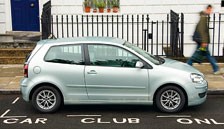Rental companies and car clubs are jostling to take a larger slice of the corporate market as fleet managers look to alternative ways of keeping their employees mobile.
Demand is being fuelled by the need for short-term mobility solutions due to staffing uncertainties during the recession.
In addition, companies are looking to reduce the risk surrounding their grey fleets in light of the Corporate Manslaughter Act and health and safety legislation.
Employers owe the same duty of care to staff driving their own vehicles for work as they do to staff driving company vehicles.
With HMRC putting the number of private cars used for business at up to four million, there is an obvious benefit to providing a safer, flexible and more cost-effective option.
Fleet managers once opted for a company pool car; now car clubs and daily rental offer a realistic alternative.
The question is: which offers the best option for fleets?
Rental and car clubs both tick the flexibility box – cars can be taken as and when required.
There are differences with pricing.
Rental firms offers rates specifically for companies, which are ideal for organisations that need vehicles for business travel or deliveries on a regular basis, but don’t want to commit to long-term contracts.
Lorraine Farnon, UK sales director for Europcar UK Group says: “Businesses using rental benefit from online rental management systems that ensure travel policies and guidelines are adhered to, supporting duty-of-care responsibilities, environmental concerns and cost controls.”
Rental companies argue that car clubs can not match them for vehicle choice, delivery and collection.
“Flexibility is key and Avis helps fleets view things differently,” says Anthony Ainsworth, Avis UK sales director.
“Using rental in a more considered fashion saves costs without compromising employee safety or comfort.”
However, car clubs have doubled their membership from 32,000 to more than 70,000 in the past year, and they are aiming to grow their corporate membership.
The big three – City Car Club, Streetcar and WhizzGo – claim to have 7,000 fleet members combined.
“The main reason for businesses joining is to save money with pay-as-you-go motoring rather than the fixed costs of owned or leased, or the hassles of grey fleet,” said James Finlayson, chief executive of City Car Club.
And, while he admits fleet managers looking for a vehicle for a week or more at a time would be better off opting for rental, he says businesses are drawn to car clubs because of their ability to offer ‘real’ flexibility with bookings starting from as little as an hour.
Keith Kelly, commercial director at car club WhizzGo, describes it as the difference between businesses being able “to use a car when they need one without having to pay for one when they don’t”.
This point is not lost on Streetcar customer Robert Laughton, of The Water Delivery Company, who says: “If we had to rent a van from a traditional hire company, we’d be paying for more time than we’d need.”
However, another fleet manager who asked not to be named, says her issue is the complicated nature of the payment system.
“You have to be aware of the mileage limit and the time limit – if you go over, you get hit with a big bill,” she says.
Questions remain over the Duty of Care issue. Fleets report that car clubs do not check cars after every use; at best they check cars once a month. Fleet best practice recommends a weekly check of areas such as oil, lights, tyres and washer levels.
Both car clubs and daily rental recognise that flexibility is key and, while rental companies negotiate rates on the profile and volume of a fleet’s business, car clubs make financial sense on very short-term rents, with hourly rental starting from just over £4.
Hertz, the only leading global rent-a-car company to also offer a car club – Connect by Hertz – summed up the car club versus daily rental debate.
“Car rental is beneficial for longer to overnight trips, or where different standards of vehicles are required,” says Mark Tristram-Walmsley, Hertz UK commercial director.
“Fleets with a shorter rental profile can opt for car sharing to pay only for the hours they use rather than by the full day in daily rental.”














Login to comment
Comments
No comments have been made yet.